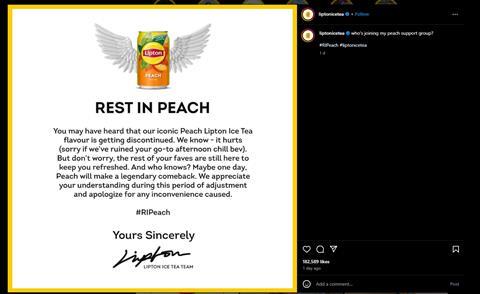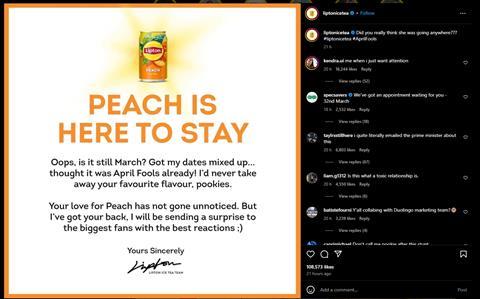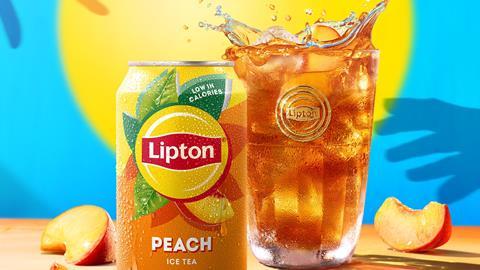Haven’t those pencil-necked desk jockeys at the Advertising Standards Authority got anything better to do than literally outlaw fun? You can’t even make an April Fool’s joke anymore without the government chucking you in (marketing) jail. Where’s everyone’s sense of humour gone?
Such sentiment is possibly swirling round Pepsico headquarters today after the ASA ruled the “light-hearted April Fool’s joke” (PepsiCo’s words) that Lipton Ice Tea’s core peach variant was about to be discontinued was misleading.
Back in March, Lipton posted a graphic of its peach flavour can adorned with angel wings to its Instagram and TikTok accounts, with the caption: ‘Rest in Peach’.
“You may have heard that our iconic Peach Lipton Ice Tea flavour is getting discontinued,” the posts read. “We know – it hurts (sorry if we’ve ruined your go-to afternoon chill bev). But don’t worry, the rest of your faves are still here to keep you refreshed. And who knows? Maybe one day, Peach will make a legendary comeback.”
PepsiCo’s side-splitting initial plan was to reveal the hoax on April 1, but consumer backlash and confusion forced an early reveal.

Lipton Ice Tea: Rest in Peach
It “was not meant to be taken seriously” the brand said in its defence to the advertising regulator. Didn’t anyone spot the “playful tone” and copywriting “designed to convey humour”? Perhaps, but that still doesn’t make it in any way funny.
And apparently April Fool’s jokes – which, let’s be honest, in an era of soaring public mistrust in media and brands are surely coming to an end – can now just run for weeks in advance? Are PepsiCo staff pinching and punching each other from the 20th of each month? Judging by what they find funny, quite possibly.
The ASA clarified to The Grocer today that: “We’re not outlawing humour or April Fool’s jokes!”. The issue it had with the Instagram post was that “it was not clear [the ad] was a joke, heightened by the fact it didn’t appear close to April Fool’s Day”.
After all, for those out there not already weary of the endless engagement bait attempts by brands – to the extent that faking their own extinction isn’t even original anymore – the posts could have been taken at face value. And this would be “likely to affect consumers’ decisions in relation to whether, and in what quantities, to purchase the product” the ASA said.

Lipton Tea told the ASA it “would ensure future campaigns of a similar nature were clearly signposted as being a joke” (the hallmark of great comedy). Cue incoming complaints about dull stunts being falsely described as jokes.
Just a few months after The Grocer called for the death of the fake brand demise hoax, it appears the regulator too has seen the unfunny side.
Humour is blisteringly effective as a marketing tool. Research from Oracle found about 90% of consumers are more likely to remember a funny ad, and 72% would choose a humorous brand over its competitors. And pleasingly, funny ads are making a comeback with 75% of UK and US Cannes Lions film award winners in 2024 using humour, up from 52% in 2023. The likes of Aldi and Yorkshire Tea have applied humour to their social media posts with brand-defining impact.
But the just-a-prank-bro, we’re-dying-lol fake death marketing device is not that. And now, is potentially in breach of advertising rules too. Rest in peace. You won’t be missed.




















No comments yet